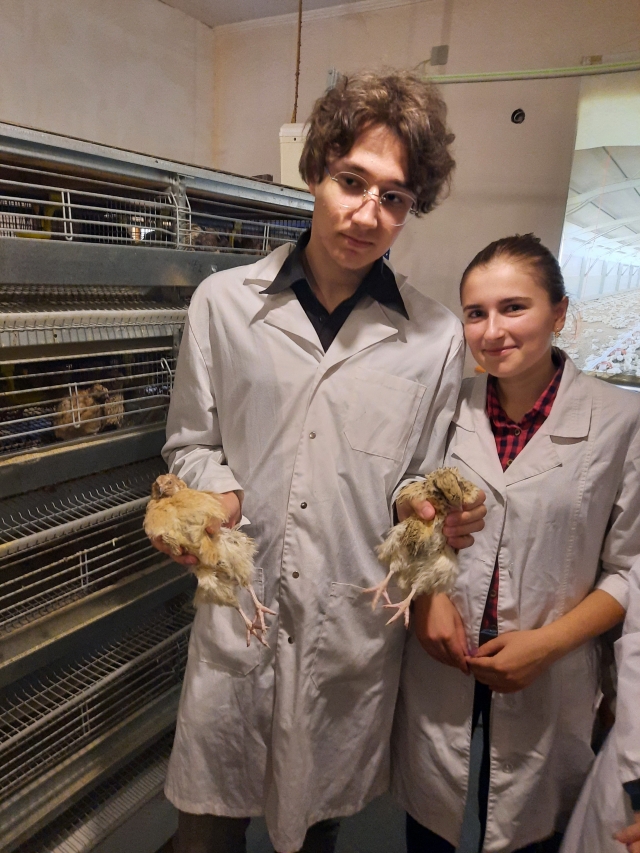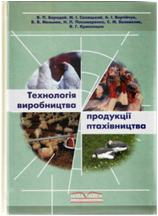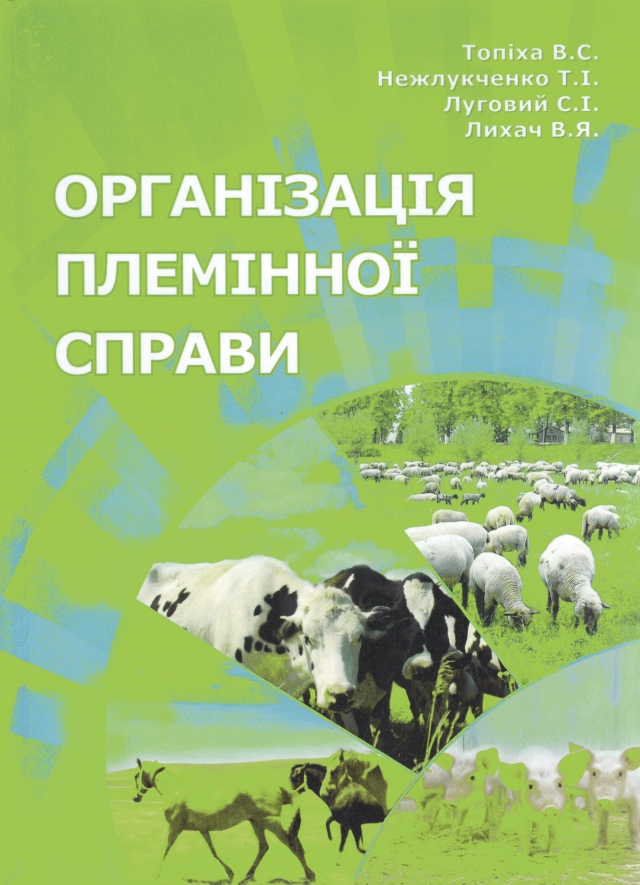Educational work
The following disciplines are taught for students of the Bachelor's degree program in Technology of Production and Processing of Livestock Products:
Technology of production of poultry products
The discipline involves the study of biological characteristics of poultry (chickens, turkeys, geese, ducks, quails, ostriches, guinea fowls, pigeons); breeds and crosses of poultry of different species, their use in modern industrial poultry farming: features of the organization and conduct of breeding work in poultry farming; embryonic development and technology of incubation of eggs of agricultural poultry. poultry; modern technologies for the production and processing of eggs and poultry meat, as well as poultry by-products (organization of the production process, requirements for technological premises, basic parameters of basic technologies, organization and control of poultry feeding, technological control of poultry production, quality control of poultry products); issues of organization of modern industrial and farm poultry farms.
Technology of sheep production
The discipline involves the study of the biological characteristics of sheep; technologies of production, primary and advanced processing of sheep products: wool, lamb, mutton, milk, sheepskin and rawhide; sheep breeds of different production areas, their use in modern conditions of the national and world market; peculiarities of organization of breeding work in farms of different types; principles of formation of breeding flocks; formation of a group of sire rams; maintenance and care of sheep flocks; structural scheme of formation of competitive production and processing of sheep products in Ukraine; issues of organization of agro-industrial complexes in sheep breeding, system of farms.
Technology of production of rabbit and cattle breeding products
The discipline involves providing a system of theoretical knowledge and practical skills in breeding, feeding, keeping and production technologies, processing of rabbit products: meat, skins, down, skins, laying the scientific foundations for the formation of a competitive industry in market conditions. The main task of studying the discipline is to train a highly qualified specialist (technologist) in the following areas: obtaining products of high breeding value, production technologies, primary and advanced processing of commercial rabbit products.
Technology of goat production
The discipline involves the study of the biological characteristics of goats; technologies of production, primary and advanced processing of goat products: milk, meat, wool and fluff, leather and fur; goat breeds of different production areas, their use in modern conditions of the national and world market; theoretical foundations and practical methods of goat breeding; features of the organization of breeding work in farms of different types and forms of ownership; technology of reproduction of the goat herd; feeding and keeping goats; technology of production and processing of goat milk; structure of the
Technology of production of pig products
The discipline aims to provide students with theoretical knowledge and practical skills in breeding, feeding, keeping and using pigs, to lay the scientific foundations for obtaining the maximum amount of high-quality products from animals. The goal is achieved through the solution of special educational and training tasks. Special educational tasks are solved in the process of mastering the theoretical and practical foundations of the discipline: origin and breeds of pigs, theoretical foundations of breeding and breeding methods, organization of breeding work, technological solutions for pork production in different conditions.
Fundamentals of animal husbandry
The purpose of the discipline is to form a system of knowledge and skills in students on the issues of breeding, reproduction of animals, feeding, maintenance and production technologies, primary and advanced processing of farm animal products. The objectives of the discipline are to provide future specialists with knowledge of the biological basis of breeding farm animals, the biology of nutrition of domestic animals of different species and the organization of scientifically sound feeding, feed preparation technology, methods of assessing the nutritional value and quality of feed, control of the adequacy of animal feeding, the main parameters and principles of production technology of the main types of livestock products in farms with different forms of ownership, which relate to special livestock and its intensification. Since the teacher is unable to provide the student with absolutely sufficient knowledge of the discipline for his or her future activities, an important task is to develop the student's ability to acquire knowledge independently (independent study), to foster a creative approach to solving problems of livestock production technology with low cost and high profitability.
Features of biotechnical objects of agricultural production
The discipline involves the study of biological characteristics of farm animals; types of productivity of farm animals; quantitative and qualitative characteristics as components of the structure of formation of different types of productivity in animal ontogeny; the influence of hereditary and paratypical factors on the production of farm animals; method and process of production; the concept of ontogeny and phylogeny of animals; the general concept of reproduction of livestock as a production mechanism for the implementation of the method of production of livestock products; feeding as one of the
Ornamental poultry farming
Birds are an integral part of all habitats and play an important role in food chains. Birds are characterized as indicators of the state of the natural environment they inhabit. The avifauna of Ukraine includes more than 400 species. Certain species of birds are currently listed in the Red Data Book of Ukraine (which indicates the conservation status of birds in our country and according to the criteria of the International Union for Conservation of Nature), with 91 species included in its latest edition (2021). A large number of birds belong to game species, which are allowed to be hunted within the established time limits. In addition, since ancient times, people have domesticated birds, which were valued for their beautiful singing and decorative plumage. To keep these birds in captivity, you need to have some information about them. Studying the discipline helps to gain knowledge about the avifauna of Ukraine in general, birds that have a conservation status and those that are kept as ornamental. The student acquires skills in breeding, keeping and feeding ornamental birds.
Horse breeding and stud farming
The objectives of the discipline are to provide future specialists with knowledge of the biological characteristics of horses related to their maintenance, feeding, reproduction, behavior, adaptation to living conditions and use; the origin of horses and their wild relatives, justification of common ancestry and features of species differentiation; conditions for creating and methods of improving and refining breeds of horses for various purposes; the main directions of productivity and development of the industry in the short and long term (public or private horse breeding).
The department trains students of the Master's degree program in elective disciplines:
Organic production of goat products
The purpose of the discipline "Organic production of goat products" is to provide students with a system of theoretical knowledge and practical skills on the development of the organic sector in the world and Ukraine; general rules and features of organic production, primary processing and advanced processing of goat products in farms with the status of "Organic production".
The objective of the discipline is to train a highly qualified technologist in the organization of organic production of goat products. In the process of professional training, the student must master the general requirements for organic production: reproduction and reproduction of goats; conditions of animal husbandry; specifics of feed production and animal feeding; features of animal care; technological solutions and methods of processing, packaging and labeling of organic products, etc.
Design of pig production facilities
The discipline combines a complex of sciences that require the student to develop skills in synthesis, analysis and decision-making in the optimal layout of production facilities and their equipment for pig housing, feed supply and feed distribution, water supply and creation of optimal microclimate conditions. An important component of the discipline is the acquisition of skills to analyze the regulatory documents governing the functioning of the pig industry and, accordingly, the current legislation, to make space-planning decisions and veterinary and sanitary measures, including the management of pig by-products. The main purpose of studying the discipline "Design of Pig Production Enterprises" is to train qualified specialists capable of rational application of design and technological solutions for the production of pig products.
Industrial pig production
The discipline combines a complex of sciences that study the peculiarities of reproduction, housing, feeding, watering pigs, providing microclimate, manure removal, manure utilization, space planning solutions, sanitary and veterinary measures, etc. The discipline "Industrial technologies for the production of pig products" also considers regulatory documents that regulate the use of certain equipment and methods of their placement depending on the technology of pork production. Therefore, the main purpose of studying the discipline is to train qualified specialists who are able to solve issues of rational use of modern industrial technologies for the production of pig products.
Animal husbandry as a business
The purpose of the discipline is to study the current state of fur farming, the experience of the world's leading countries in the effective management of fur farming and to organize the production of the main products of fur farms in an economically efficient manner. The main objective of the discipline is to provide fur-breeding specialists with solid theoretical knowledge and practical skills in breeding, keeping, feeding, breeding animals and evaluating fur and fur products; to familiarize students with the best practices of fur-breeding farms in European countries; to teach students to independently draw up long-term plans for the development of their own fur-breeding farms, to develop and implement measures aimed at increasing business profitability; to teach students methods of management and management of the main products of fur-breeding farms.
Processing of animal products
The purpose is to study the physical, chemical and technological properties of animal products (milk, meat, eggs, honey, etc.) as raw materials for the manufacture of high-quality products of various assortments and their changes under the influence of technological factors; requirements of regulatory documents for the quality of raw materials and finished products made from them according to existing technologies, instructions in the conditions of processing enterprises and assessment of their quality in accordance with the requirements of regulatory documents. The objective of the discipline is to ensure that, on the basis of theoretical knowledge and practical skills in assessing the quality of raw materials and processing of livestock products, technological features that depend on various factors, parameters of technological processing, the future specialist should be able to organize the processing of raw materials in production conditions according to rational schemes in order to obtain the maximum yield of edible parts with the least losses without violating environmental safety.
Modern technologies of industrial poultry farming
The subject of the discipline is the study of the technological process of production and primary processing of food eggs and poultry meat, as well as poultry by-products with the organization of product quality control in farms of various types and forms of management using modern achievements of domestic and foreign science. The purpose of the discipline is to develop students' professional knowledge and skills in the analysis, development and implementation of effective modern technologies for the production and processing of poultry products, taking into account technical, economic, social, legal and environmental aspects to increase the profitability of the industry and the competitiveness of poultry products.
Animals in Ukrainian and World Culture
The purpose of the discipline is to improve humanitarian training and deeply familiarize students with the cultural traditions of the peoples of the world regarding the treatment of animals, the use of livestock products from ancient times to the present, to raise the ethnic consciousness of students and their professional training, to form professional knowledge and skills in the analysis, development and implementation of effective technologies for the production and processing of livestock products, taking into account social, economic and legal aspects. Mastering this discipline provides future specialists with the opportunity to evaluate the achievements of national and world culture in the context of animal treatment, form an ethical attitude towards animals, adherence to humanistic principles, high moral and ethical principles in public life and professional activities, and will allow them to identify, implement and ensure the functioning of humane technologies for the production and processing of livestock products in the concept of sustainable development.
Technology of organic livestock production
Aim - to study the technological process of production and primary processing of organic livestock products, as well as livestock by-products with the organization of product quality control in farms with the status of "Organic Production" using modern achievements of domestic and foreign science. Objectives - to form students' knowledge of the modern technological process of production and primary processing of livestock products in organic production; the economic importance of organic production in various livestock sectors; the importance of quantitative and qualitative feed requirements in organic production; rules of organic production and the procedure for certification of the farm.
The department also teaches compulsory and elective courses for PhD:
Modern trends in the development of technologies in animal husbandry
The purpose of the discipline is to form students' professional knowledge of the existing ways of developing technologies for the production of livestock products and their components, the introduction of individual technological solutions into existing technological schemes of the livestock industry, and the possibilities of diversifying production. The objective of this discipline is to provide future specialists with the opportunity to identify promising areas for the development of technologies in the country's livestock industry, taking into account the peculiarities of livestock enterprises, the diversity of their forms, existing breeding resources, technical and technological solutions, regulations and the legislative framework of the industry.
Modern technologies of pig production
The subject of the discipline is the study of modern industrial technologies for the production of various types of pig products, their development, implementation and distribution. The purpose of studying the discipline is to form students' professional knowledge of existing ways to improve technological processes of pig production aimed at resource and energy conservation, obtaining high-quality products and increasing the profitability of the industry. Mastering this discipline gives future specialists the opportunity to identify areas for improving technological processes of production in order to optimize them and minimize resource consumption based on an analysis of existing technologies in pig production.
Modern technologies for the production of horse breeding products
The subject of the discipline "Modern technologies of horse breeding production" is the study of modern breeding and industrial technologies for the production of various types of horse breeding products, their development, implementation and dissemination. The purpose of studying the discipline is to form students' professional knowledge of existing ways to improve the technological processes of production of basic (performance) and additional (horse meat, milk, kumys) horse breeding products aimed at resource and energy conservation, obtaining high-quality products and increasing the profitability of the industry. The objective of this discipline is to enable future specialists to identify areas for improving technological processes of production in order to optimize them and minimize resource consumption based on an analysis of existing technologies in horse breeding.



The department has the following facilities:
· training laboratory of pig breeding;
· training laboratory of egg production technology;
· training laboratory of poultry meat production technology;
· training laboratory of sheep and goat breeding;
· Training laboratory of rabbit and fur farming;
· training laboratory of information technologies in animal husbandry;
· training and exhibition pavilion of technological equipment in pig breeding;
· training and exhibition pavilion of technological equipment in poultry farming;
· educational and research laboratory of poultry production technologies;
· educational, research and production laboratory of horse breeding.


















The staff of the department has published 14 monographs, 8 textbooks, 9 manuals, 75 scientific and methodological recommendations, 340 articles, 35 of which were published in international journals.
The staff of the department is the author of standard curricula in the following disciplines: "Poultry farming and technology of eggs and poultry meat production", "Technology of poultry production", "Technology of pig production", "Breeding of farm birds", "Production and processing of sheep and goat products", "Fundamentals of animal husbandry", "Technology of production, processing and storage of agricultural products".
































